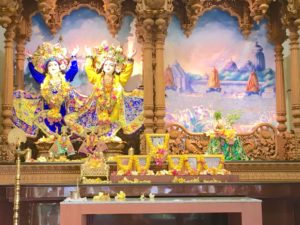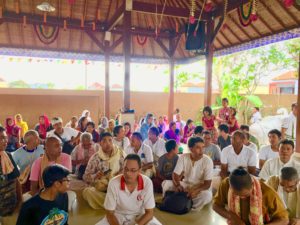The post Daily Darshan: June 19, 2017 appeared first on Mayapur.com.
Daily Darshan: June 19, 2017
“Don’t Learn Too Much (You’ll Find Out we Don’t Know what we are Talking About)”
→ The Enquirer
Here are some remarks people apparently still encounter from senior people in ISKCON when they talk about their intention to deeply study Śāstra and Sanskrit. I will add my brief replies:
“Srila Prabhupada has already translated all the relevant Sastras, so why would anyone need to learn Sanskrit? Just study his translations!”
If his translations are all that’s required, Why did he put the original Sanskrit in the books?
And why was one of his favorite disciples Pradyumna, a Sanskrit scholar?
“If you learn Sanskrit you’ll find mistakes in Srila Prabhupada’s translations – because they are not academic, but from the platform of Bhava.”
It sounds like someone is afraid of being exposed. “Don’t study too much, because then you will find out we are wrong [I mean, we are not really ‘wrong,’ we are just on a higher level].”
If you are really on a higher level, that would be more (not less) obvious to the more educated and discerning eye. If only the uneducated can appreciate your “higher level” it is not really a very high level, it is a fake.
And no, I am not saying Srila Prabhupada was a fake, I am saying that the logic in the quote above is bogus.
“Devotees who learn Sanskrit think they know everything, and lose their faith in Srila Prabhupada and the Parampara – so how can they ever be delivered?”
“People who are smart lose their faith in us, so don’t become smart, because if you lose faith in us you are doomed.”
Cult alert.
The reasonable conclusion is, “People who are smart lose their faith in us, so, probably we are not so great.”
By the way, most of the people who study Sanskrit and Śāstra probably don’t “lose faith in Śrīla Prabhupāda.” They probably lose faith in the cult of ISKCON. And, despite what the cult says, the two are not completely identical.
Scholarship will never take us to Bhakti.
Neither will lack of scholarship.
Sambandha-jñāna (philosophical knowledge) is the foundation of abhidheya (the practices of bhakti), which is the foundation of prayojana (the goal of bhakti, prema.). So, the truth is that very clear comprehension of Vedic, Purānic, and Vaiṣṇava philosophy IS the foundation of what will take us to bhakti.
Vraja
Jagannatha Gauranga
→ Ramai Swami
Since the Snana Yatra festival, the devotees at Jagannatha Gauranga temple in Bali are missing the darshan of Their Lordships, Jagannatha, Baladeva and Subhadra.
Their Lordships are resting in a nearby room and being taken care of nicely by the pujaris. In a few weeks time They will be seen again at the Rathayatra in one of the main parks of Denpasar.
Happy Father’s Day
Giriraj Swami
Srila  Prabhupada expressed his appreciation for his father in his dedication to his book Krsna, the Supreme Personality of Godhead, “To My Father, Gour Mohan De (1849-1930)”—“A pure devotee of Krsna, who raised me as a Krsna conscious child from the beginning of my life. In my boyhood ages he instructed me how to play the mrdanga. He gave me Radha-Krsna vigraha to worship, and he gave me Jagannatha ratha to duly observe the festival as my childhood play. He was kind to me, and I imbibed from him the ideas later on solidified by my spiritual master, the eternal father.”
Prabhupada expressed his appreciation for his father in his dedication to his book Krsna, the Supreme Personality of Godhead, “To My Father, Gour Mohan De (1849-1930)”—“A pure devotee of Krsna, who raised me as a Krsna conscious child from the beginning of my life. In my boyhood ages he instructed me how to play the mrdanga. He gave me Radha-Krsna vigraha to worship, and he gave me Jagannatha ratha to duly observe the festival as my childhood play. He was kind to me, and I imbibed from him the ideas later on solidified by my spiritual master, the eternal father.”
As devotees, we try to encourage and facilitate our children’s Krishna consciousness, as Prabhupada’s father did with him—an effort that is solidified when our children find their eternal spiritual masters.
Later, Srila Prabhupada wrote to one of his disciples, “You have accepted me as father, so I have also accepted you as my dear and real son. Relationship of father and son on spiritual platform is real and eternal; on the material platform such relationship is ephemeral and temporary. Although I cannot give you anything as father, still I can pray to Krishna for your more and more advancement in Krishna consciousness. Your sincerity and service mood will always help you in advancing your genuine cause.”
We are indebted to all our fathers, biological and preceptorial. To those still with us, we wish you Happy Father’s Day. To those who have left us, we love you and miss you, and we shall try to act in such a way as will please you—and Krishna, the Supreme Father.
Hare Krishna.
Yours in service,
Giriraj Swami
London Ratha Yatra today (Album with photos) Srila Prabhupada:…
→ Dandavats
 London Ratha Yatra today (Album with photos)
Srila Prabhupada: If we simply place ourselves at the lotus feet of Krishna by taking to Krishna co...
London Ratha Yatra today (Album with photos)
Srila Prabhupada: If we simply place ourselves at the lotus feet of Krishna by taking to Krishna co... Catholic Groups Launch Conversation about Female Deacons
→ ISKCON News
US Southern Baptists Condemn White Supremacy
→ ISKCON News
The Myth of Old Age
→ ISKCON News
Interview-Agnidev- Laguna Beach Temple Purchase (audio)
→ Dandavats
 Interview-Agnidev- Laguna Beach Temple Purchase (audio)
Agnidev tells how they got the temple in Laguna Beach even though the whole town was agai...
Interview-Agnidev- Laguna Beach Temple Purchase (audio)
Agnidev tells how they got the temple in Laguna Beach even though the whole town was agai... ‘The Art of Teaching’ Is Available As E-book
→ ISKCON News

This book by Bhurijana Das contains the essence of his years of teaching experience and his study of Srila Prabhupada’s instructions on education. Included are such topics as the importance of the mode of goodness in teachers and students, how to become self-disciplined, principles of organization and management, ideas for setting and achieving objectives, how to lead discussions, ask effective questions, listen, and counsel.
BB Govinda Swami Singing at Sadhu Sanga Retreat 2017
→ ISKCON News
Bhagavad-gita: Starting at the beginning (Part 2)
→ SivaramaSwami.com
Bucharest talks No 2.
Kalindi and her Boyfriends (5 min video)Chayadevi: Kalindi was…
→ Dandavats

Kalindi and her Boyfriends (5 min video)
Chayadevi: Kalindi was only 3 years old and had produced
23.096 pounds of milk but she couldn’t get pregnant again and her milk production had fallen below 60 pounds a day when the dairy farmer who owned her was about to sell her for meat. ISCOWP members purchased her and saved her from becoming meat on someone’s dinner plate. This video is about her life and the life of 2 of her friends (also saved from slaughter) 2 years later.
Watch it here: https://goo.gl/BBxv3w
The ecstatic experience of Love as a key to unseal the treasure of Authentic Happiness
→ Dandavats
 By Matsyavatara das
By Matsyavatara das Modern civilization achieved great results in countless fields, nevertheless it produced a shadow culture inclined to obsessive identification with the body, and the need to acquire richness in order to satisfy ambitions of power and exorcise fear, even knowing that, by definition, richness is like the sea water: the more you drink it the more thirsty you are. The fake myth of an easy life based on sense pleasures is the heaviest of calamities, the most painful and dreadful of all. Richness, aging, youth, beauty do not guarantee happiness, otherwise addictions to drugs, violence, alcohol or tobacco would not be wide spread problems. Continue reading "The ecstatic experience of Love as a key to unseal the treasure of Authentic Happiness
→ Dandavats"
The Art of Teaching – A Guide for Training Our Children in…
→ Dandavats

The Art of Teaching – A Guide for Training Our Children in Krishna Consciousness by His Grace Bhurijana prabhu, is now available as an eBook on Amazon Kindle.
eBook link: http://a.co/acbiOzv
A valuable resource for parents, teachers, preachers, and anyone else who wants to teach. Bhurijana Dasa began his teaching career in 1976, working with students and developing curriculum. This book contains the essence of his years of teaching experience and his study of Srila Prabhupada’s instructions on education. Included are such topics as the importance of the mode of goodness in teachers and students, how to become self-disciplined, principles of organization and management, ideas for setting and achieving objectives, how to lead discussions, ask effective questions, listen, and counsel. Also, contains Srila Prabhupada’s quotes on gurukula and a section on child protection.
Devotees may also avail of the hardback from the same above link.
For bulk orders of the hardback book, please write to info@vihepublications.com
Website: http://www.vihepublications.com
Kalindi Vijaya and Her Boyfriends
→ ISKCON News

Kalindi was only three years old and had produced 23, 096 pounds of milk but she couldn't get pregnant again and her milk production had fallen below 60 pounds a day when the dairy farmer who owned her was about to sell her for meat. ISCOWP members purchased her and saved her from becoming meat on someone's dinner plate. This video is about her life and the life of two of her friends (also saved from slaughter) two years later.
Harinama in Western Siberia, Altai Krai, Russia (Album with…
→ Dandavats
 Harinama in Western Siberia, Altai Krai, Russia (Album with photos)
With every step of Harinama on Earth
Life becomes purer, brighter and wonderf...
Harinama in Western Siberia, Altai Krai, Russia (Album with photos)
With every step of Harinama on Earth
Life becomes purer, brighter and wonderf... Demystifying Reincarnation 1 – Incredible delusion or credible vision?
→ The Spiritual Scientist
Answer Podcast
The post Demystifying Reincarnation 1 – Incredible delusion or credible vision? appeared first on The Spiritual Scientist.
Why didn’t the Pandavas think that the Kauravas were simply instruments of their own past karma?
→ The Spiritual Scientist
Answer Podcast
The post Why didn’t the Pandavas think that the Kauravas were simply instruments of their own past karma? appeared first on The Spiritual Scientist.
Is the Mahabharata that occurred in another age even relevant today?
→ The Spiritual Scientist
Answer Podcast
The post Is the Mahabharata that occurred in another age even relevant today? appeared first on The Spiritual Scientist.
1st Video Contest on the occasion of 46th Kolkata…
→ Dandavats
 1st Video Contest on the occasion of 46th Kolkata Rathyatra
organized by ISKCON.
1st Video Contest on the occasion of 46th Kolkata Rathyatra
organized by ISKCON. Is the Mahabharata an excellent drama or is it historically true?
→ The Spiritual Scientist
Answer Podcast
The post Is the Mahabharata an excellent drama or is it historically true? appeared first on The Spiritual Scientist.
If everything in the Mahabharata is arranged by Krishna’s plan, why do we blame Duryodhana or Karna?
→ The Spiritual Scientist
Answer Podcast
The post If everything in the Mahabharata is arranged by Krishna’s plan, why do we blame Duryodhana or Karna? appeared first on The Spiritual Scientist.
Why is Arjuna considered the greatest archer when all his power came from Krishna?
→ The Spiritual Scientist
Answer Podcast
The post Why is Arjuna considered the greatest archer when all his power came from Krishna? appeared first on The Spiritual Scientist.
If Dhritarashtra had stopped Duryodhana from fighting, how would the Gita have been spoken?
→ The Spiritual Scientist
Answer Podcast
The post If Dhritarashtra had stopped Duryodhana from fighting, how would the Gita have been spoken? appeared first on The Spiritual Scientist.
When Dhritarashtra was forced by the modes to support Duryodhana, why is he blamed?
→ The Spiritual Scientist
Answer Podcast
The post When Dhritarashtra was forced by the modes to support Duryodhana, why is he blamed? appeared first on The Spiritual Scientist.
Did the celestial voice stopping Duryodhana from committing suicide interfere with his free will?
→ The Spiritual Scientist
Answer Podcast
The post Did the celestial voice stopping Duryodhana from committing suicide interfere with his free will? appeared first on The Spiritual Scientist.
Shoes made for walking: Monk walks through Craig, Colorado,…
→ Dandavats

Shoes made for walking: Monk walks through Craig, Colorado, USA.
Marathon walker Bhaktimarga Swami — The Walking Monk — is passing through Craig and Moffat County this weekend. Swami, formerly John Peter Vis, a 64-year-old Canadian, has been taking long walks since he was about 5 years old. He adopted the monastic lifestyle of the Hare Krishna order in 1973 and incorporated marathon walking into his spiritual practice. In 1996 he walked across the entire length of Canada which was documented in the Canadian film “The Longest Road.” This year he is walking across America in honor of his guru, Swami Prabhupada, and in celebration of the 50th Anniversary of the incorporation of the International Society for Krishna Consciousness in America.
Cultural presentation of Krishna consciousness in Moscow (Album…
→ Dandavats
 Cultural presentation of Krishna consciousness in Moscow (Album with photos)
Srila Prabhupada: By chanting the Hare Krishna mantra, we gradually ...
Cultural presentation of Krishna consciousness in Moscow (Album with photos)
Srila Prabhupada: By chanting the Hare Krishna mantra, we gradually ... Kalash Installation Begins
- TOVP.org
After several weeks of assembling the titanium nitrate Kalashes, we have finally reached the final stage of commencing their installation on top of the TOVP Domes and Chatris.
This is a major achievement in the progress of the TOVP, and if the Lord allows us we are on schedule to complete the installation of both the Kalashes and Chakras by the end of 2017 with a grand installation ceremony.
In the video you can view the first piece being hoisted up by the immense crane on the premises and placed upon the first Chatri. It will be securely fastened down onto the Chatri, followed by the remaining pieces. This same sequence will continue for all the Domes and Chatris until all the Kalashes are mounted.
To donate for the completion of the main TOVP dome Chakra, please contact Braja Vilas prabhu at: *protected email*
The post Kalash Installation Begins appeared first on Temple of the Vedic Planetarium.
Marble Cladding and Window Installation Progress
- TOVP.org
Marble cladding work on the temple exterior and the installation of Rajasthani style sandstone window frames on the higher levels of the structure continues throughout various areas of the TOVP and will soon cover all sections of the temple, floor by floor.
The post Marble Cladding and Window Installation Progress appeared first on Temple of the Vedic Planetarium.
Time, the Winkless God
→ Dandavats
 By Mathuresha Dasa
By Mathuresha DasaA look at what the Srimad-Bhagavatam has to say about time, a concept that has challenged philosophers for centuries. Time is a little difficult to define. Philosophers and theologians have tried for at least twenty-five centuries. Albert Einstein remarked, in the midst of slightly more esoteric statements regarding physics, that time was what his wristwatch measured. St. Augustine said that he knew what time was as long as no one asked him to explain it. And sounding a note of frustration in her book What, Then, Is Time (the title too is from St. Augustine), Eva Brann laments, “Why don’t I know what that is which I tell, save, spend, mark, waste, and even kill every day of my life with perfect aplomb?” Continue reading "Time, the Winkless God
→ Dandavats"
Kaliya Lila – HG Bhurijana Prabhu (video)10 June 2017 at Hare…
→ Dandavats

Kaliya Lila – HG Bhurijana Prabhu (video)
10 June 2017 at Hare Krishna Valley, Victoria, Australia.
Watch it here: https://goo.gl/EoRVux
Saturday June 17, 2017
→ The Walking Monk
Friday June 16, 2017
→ The Walking Monk
HG Rohinipriya das prabhu will be at ISKCON Scarborough coming Friday- June 23rd 2017
→ ISKCON Scarborough
Please accept our humble obeisances!
All glories to Srila Prabhupada!
All glories to Sri Guru and Sri Gauranga!
We are pleased to inform you that HG Rohinipriya das prabhu will be at ISKCON Scarborough coming Friday (23rd June 2017) to give a special class.
Program starts at 6:45 pm.
Biodata of HG Rohinipriya das prabhu:
HG Rohini Priya Das prabhu graduated as a doctor of Medicine from Mumbai university but decided to dedicate his life in the service of Lord Krishna.
Prabhu, is a senior Brahmachari at ISKCON's Sri Radha Gopinath mandir at Chowpatty,Mumbai,India.
He is currently serving as the Vice President at ISKCON Chowpatty in Mumbai.
For the last 25 years he has not only been practising Krishna Consciousness but has been actively distributing the message of Bhagavad Gita to thousands of Engineering , Medical students and other professionals all over India.
He also travels widely to USA, UK, Singapore, Malaysia, Mauritius, Nepal and Canada and delivers various classes/ seminars on Krsna Consciousness.
We welcome you, your family and friends to ISKCON Scarborough coming Friday
ISKCON Scarborough
3500 McNicoll Avenue, Unit #3,
Scarborough,Ontario,
Canada,M1V4C7
Email Address:
iskconscarborough@hotmail.com
website:
www.iskconscarborough.com
Daily Darshan: June 18,2017
→ Mayapur.com
The post Daily Darshan: June 18,2017 appeared first on Mayapur.com.
On the altar
→ KKSBlog
(Kadamba Kanana Swami, 25 April 2017, Radhadesh, Belgium, Srimad Bhagavatam 7.15.68)
 Worshiping the deity is a way to regulate our lives but this is not the real thing about worshiping the deity. In worshiping the deity, when you step onto the altar, you step into the spiritual world. Whoever is on the altar is actually in the spiritual world.
Worshiping the deity is a way to regulate our lives but this is not the real thing about worshiping the deity. In worshiping the deity, when you step onto the altar, you step into the spiritual world. Whoever is on the altar is actually in the spiritual world.
Although devotees are in the spiritual world while on the altar, they do not just walk around. They do everything according to prescribed rules and regulations. Everything is done according to the directions of scripture and in the mode of goodness because although we are elevated to the spiritual world by the mercy of the guru-parampara and by the mercy of Krsna who agrees to this whole system still we are not suitable to be in the spiritual world. We are like outsiders in the spiritual world. We do not really belong there but still, we are put on the altar when we are engaged in deity worship. All the arrangements on the altar are like the arrangements in the spiritual world – very opulent seating arrangements, thrones for Radha and Krsna, beautiful decoration, beautiful clothing and delicious foodstuff – the best of the best are being offered just as it is going on in the spiritual world.
In this material world, you cannot leave your house without a phone but in the spiritual world, you cannot leave the house without an aarti tray! You have to have one with you at any time because there is always someone to worship. Aarti is something like, “Hi, how are you?” You start to worship, this is a spiritual culture. It is quite amazing, everyone worships everyone, everyone glorifies everyone. In this way, there are loving exchanges, deeply respectful exchanges.
Respect comes from recognising good qualities in people, not only to recognise these good qualities but actually to deeply appreciate them, when we truly think a person is absolutely wonderful because the person has amazing qualities, it is actually very nice. In the spiritual world, everybody is like that! Everybody is full of wonderful qualities and everyone is appreciating everyone!
Are Christian missionaries in India funded from the West?
→ The Spiritual Scientist
Answer Podcast
The post Are Christian missionaries in India funded from the West? appeared first on The Spiritual Scientist.
Are some people utterly incapable of understanding God’s form – are some religion’s revelations customized for such people?
→ The Spiritual Scientist
Answer Podcast
The post Are some people utterly incapable of understanding God’s form – are some religion’s revelations customized for such people? appeared first on The Spiritual Scientist.










